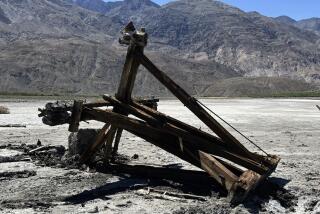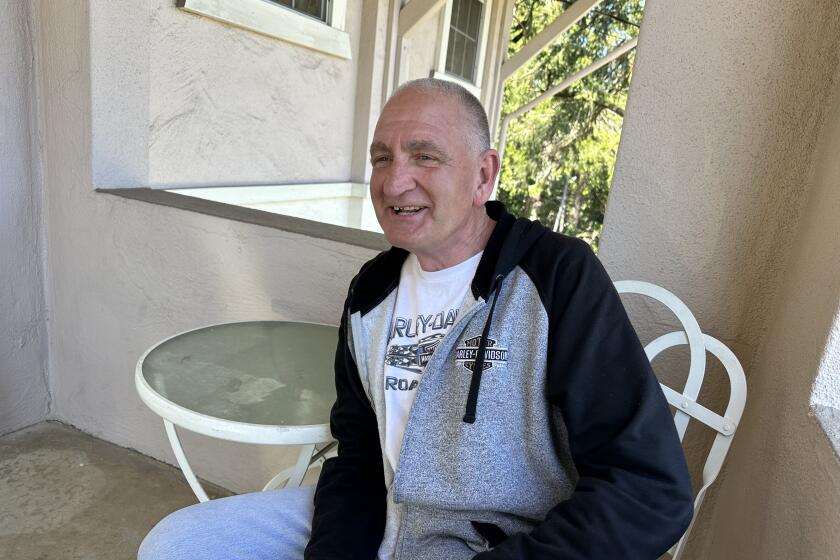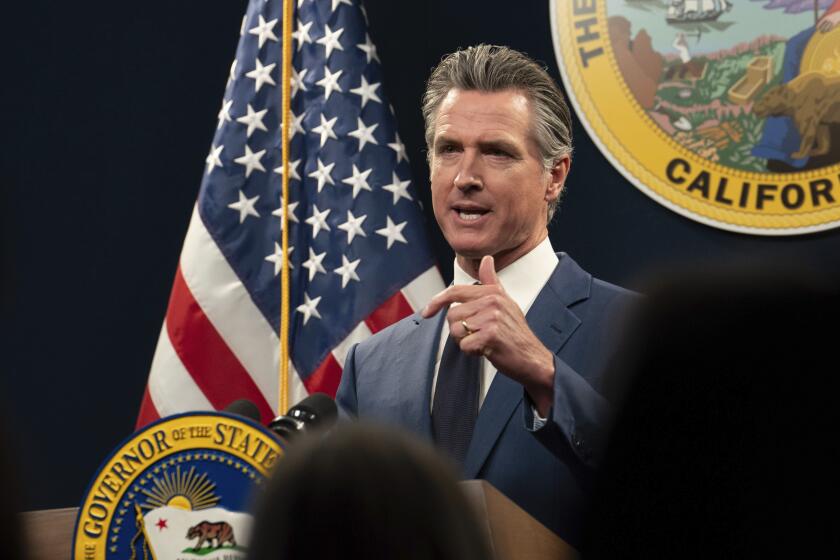State’s Pipeline Safety Chief Was Fired in April, Weeks Before Blast
The chief of the state’s pipeline safety program was fired in April by the California fire marshal on a variety of charges, including allegations that he accepted loans and gifts from oil industry officials in violation of conflict-of-interest laws, The Times learned Friday.
The former official, Walter J. Hernandez, has denied the allegations in an appeal filed with the state Personnel Board, contending, among other things, that he was fired for complaining that about $250,000 in state funds was diverted from pipeline safety to other programs in the fire marshal’s office.
The usually low-profile agency has come under fire recently because its inspectors failed to detect any problems in a gasoline pipeline after a major train derailment in San Bernardino. The pipeline exploded in the residential neighborhood on May 25--after Hernandez’s dismissal--killing two people, injuring 31 and damaging or destroying 15 homes.
Others Attended to Wreck
His acting replacement at the time of the train wreck and explosion, James Wait, is a career administrator and not a professional safety engineer. However, the fire marshal’s deputy director, Joan Jennings, said that the office is staffed by experienced professionals who were on the scene after the train wreck on May 12.
“We have engineers on our staff with many, many years of experience who are very well qualified to do their jobs,” Jennings said.
The fire marshal’s office charged that Hernandez, 64, who was experiencing “obvious financial difficulties,” repeatedly sought loans from industry representatives and subordinates within the pipeline safety program over the last five years, according to documents on file with the Personnel Board. And Hernandez repeatedly failed to disclose loans and gifts that he was legally required to report, the documents said.
Additionally, his supervisors charged that on several occasions he “inappropriately deposited departmental funds under (his) control into (his) personal account.” And when Hernandez was ordered to return the money, his personal checks bounced, according to the Personnel Board records.
Won’t Discuss Dismissal
Deputy Director Jennings said that the state office would not discuss Hernandez’s dismissal because the matter is subject to litigation. Asked whether any of the allegations had been referred to prosecutors, Jennings said: “At this point, no.”
Hernandez could not be reached for comment, but his attorney, Leo F. Donahue, said that the charges are untrue and that his client is battling to win back his job.
In appealing the dismissal, Donahue contended that the charges were “pretextual,” and that the “actual reason for his termination is that he has discovered and reported illegal fiscal manipulation within the state fire marshal’s office that has resulted in the misappropriation of approximately $250,000 for the fiscal year 1987-88 alone.”
In his former job, Hernandez was responsible for the state’s pipeline safety inspection program, which acts as an agent for the U.S. Department of Transportation in California. Attorney Donahue said that Hernandez had built the program from nothing into one that was a model for the country. He noted that his client’s “reputation is nationwide “ and that he has a seat on the Department of Transportation’s Hazardous Liquid Pipeline Safety Board.
Among the specific charges leveled at Hernandez in his official dismissal notice were that:
- In February, 1987, he asked Emmett Cooper, an executive of Beacon Oil, a pipeline operator, for a loan of $5,000, promising to repay in five months. The money had not been repaid by the time of Hernandez’s firing. After the loan, Hernandez “lobbied (his) supervisors extensively” to hire Cooper as a pipeline safety engineer.
- In March, 1988, Hernandez asked Tim Cohen, a manager for Celeron Pipeline Co., for a $2,500 loan. Cohen loaned him $1,000, which also has not been repaid. Cohen, according to the document, was fired by the company for violating its conflict-of-interest rules. He could not be reached for comment Friday.
- Two years ago, Andy Dakis, a manager for Chevron Pipeline Co., turned down a request by Hernandez for a loan of “several thousand dollars,” Dakis told the fire marshal’s office. But two months ago, when asked about the request, Hernandez denied ever having made it.
- In 1987, Chuck Samo, a subordinate of Hernandez, agreed to lend him “several thousand dollars,” part of which was repaid in installments. The order firing Hernandez said that Samo’s wife got “disturbed” when the payments ceased and hired a lawyer to demand full payment. The loan and legal fees were finally paid.
- In October of 1985, Hernandez deposited unspecified receipts from a state-operated training seminar held on the Queen Mary into his personal checking account and repeated the alleged offense again the following year. When officials demanded repayment of the money, Hernandez wrote bad checks.
- Two months ago, Arco, a major pipeline operator under Hernandez’s jurisdiction, reported that he asked for and received a gift of dinner, drinks and tickets to a Sacramento Kings-Boston Celtics basketball game valued at $194.28. This violated the fire marshal’s conflict-of-interest rules and state law requiring that such gifts be reported.
- In 1985, Hernandez ordered a subordinate, Les Johnson, to drive Hernandez’s wife to Carson City, Nev., on state time and, along with Johnson, reported the time spent as official business.
In a point-by-point rebuttal to the charges, attorney Donahue asserted that the accusations are way off mark and that most are legally insufficient to justify firing.
Donahue conceded in the appeal document that Hernandez was “experiencing financial shortfalls because of real estate transactions,” and was referred to an employee assistance counselor for help with his fiscal affairs.
Hernandez and his superiors then agreed to a plan under which he would resign his state position, withdraw his retirement in a lump sum, repay his loans and then reapply for his old position. The rehiring process included a background check that uncovered the alleged misconduct.
However, Donahue argued that the allegations were merely a pretext for firing Hernandez, who he said had been conducting an investigation of his own into the “suspicious” disappearance of fees paid by pipeline operators and intended for safety inspections.
Hernandez charged that state Fire Marshal James F. McMullen had illegally transferred the funds to agency programs “unrelated to pipeline safety.”
Hernandez said he was repeatedly told by his superiors that the money couldn’t be tracked anyway “because there were so many mirrors.” During one discussion of the issue, Hernandez said, he was told that “none of this better leave this room.”
More to Read
Start your day right
Sign up for Essential California for news, features and recommendations from the L.A. Times and beyond in your inbox six days a week.
You may occasionally receive promotional content from the Los Angeles Times.






